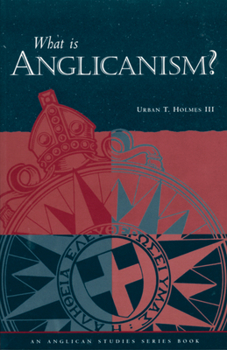What Is Anglicanism?
Select Format
Select Condition 
Book Overview
An accessible introduction to and basic understanding of Anglican heritage. The early chapters explore the Anglican consciousness, authority within the Church, and how Anglicans read the Bible. Other chapters cover Anglican understandings of the Incarnation, sacraments, liturgy, the Episcopacy, pastoral care, spirituality, mission, church and state, and prophetic witness.
Format:Paperback
Language:English
ISBN:0819212954
ISBN13:9780819212955
Release Date:January 1982
Publisher:Morehouse Publishing
Length:95 Pages
Weight:0.25 lbs.
Dimensions:0.3" x 5.5" x 8.5"
Customer Reviews
3 ratings
A Bit Quirky, But Useful
Published by Thriftbooks.com User , 15 years ago
Given all that has been happening in Anglicanism over the past twenty years, this book is in some aspects dated. The author's perspective on certain matters is also a bit idiosyncratic (his comments on the relationship of church and state will seem particularly peculiar to American readers). Those caveats aside, this is a useful overview of the Anglican approach to being Christian. Holmes' discussion of Anglicanism's appeal to a "left brain" mode of spiritual experience is particularly insightful, as is his embrace of ambiguity. Possibly not the first thing to give someone who is just considering the Anglican/Episcopal tradition, but enriching for those who already have some background and/or experience.
A possible answer, but not necessarily the only one...
Published by Thriftbooks.com User , 20 years ago
The Episcopal church in the twentieth century took advantage of the general availability of publishing to good advantage, compiling through several auspices different collections and teaching series, the latest of which was only completed a few years ago. One of the better of the 'unofficial' collections of teaching texts is the Anglican Studies Series by Morehouse press, put out in the 1980s, which comprise several volumes that look at different aspects - theology, spirituality, history, and more. The introductory volume, if you will, to this series is this text, 'What is Anglicanism?' by bishop Urban T. Holmes. Holmes, a respected educator and clergyman in the church, provided this personal set of reflections on the central question in response to the general need in a changing environment. This is not meant to be a comprehensive treatment - in a mere 100 pages of text, it could hardly hope for that. It is not heavy on history or theology, but rather in twelve chapters looks at some of the key issues involved in the church, devoting a few pages for each subject, such as liturgy, scripture, sacraments, spirituality, etc.There is no strong dogmatic or doctrinal system that the Anglican church insists upon; indeed, even the liturgical standards around which much of the church coalesces are far more flexible than many realise. Thus, this is not a book that will tell the reader what he or she must believe, or must do, but begins to approach the question of what is unique about Anglicanism, a point of continuing inquiry among Anglicans and non-Anglicans alike.Holmes wrote this text shortly after the adoption of the 1979 Book of Common Prayer by the Episcopal church and the decision to officially accept women's ordination; being an authority in the church hierarchy, he felt it important to be generally supportive of the moves the church was making in the face of dissatisfaction by many traditionalists. One of the criticisms of this book is that it is not specific, and that it wanders a bit in its text. This is true, but as Holmes discusses the Anglican consciousness in the first chapter, this kind of ambiguity is inherent in the Anglican mind. One can think of mystics and authors who embody ideas quite apart from traditional Anglican dogma, but still embody an overall ethos - C.S. Lewis, Charles Williams, J.R.R. Tolkien. Anglicanism is also a system of acknowledging the incarnation, making Anglicanism a 'sensible' religion - not necessarily sensible in terms of being practical, but rather in terms of paying attention to the experiences of the senses - worship services that involve 'smells and bells' can testify to this feature.Because Anglicanism does not have a set catechism or doctrinal system to which one must adhere, the statements in Holmes' text are subject to interpretation and change, but it does give a good introduction to the way Anglicans think.
a very good little book
Published by Thriftbooks.com User , 23 years ago
This is not an insubstantial book, in spite of its modest size of 95 pages. The author goes to some effort to dispel any notions and impressions that the Anglican Communion is socially and financially upper class. He also refrains from denominational triumphalism. There is a great deal of interesting reading on issues of missionary work, prophetic witness, the Sacrements, Bishopry and administration, and Biblical interpretation. The writing style is quite heavy but not overwhelmingly so, and is closely and coherently argued. Certain readers might find his exposition rather stiff and humorless, but very thoughtful and well researched.This book was written I believe in 1982 and it reflects issues affecting the Anglican church at that time. It is due for an updated edition, in light of recent developments. Perhaps surprisingly, there is no commentary or opinion on the Anglican position - at least in Canada from my direct experience - on the issue of encouraging participation of Baptized but not Confirmed Christians in the Eucharist. The Anglicans have come in for some criticism on this matter, even from Pope John Paul II. I enjoyed this book so much that I read it twice. For Anglicans and Episcopalians it is an excellent read, although it is not suited for novices to Christianity. Considering there is not a great deal of literature in this specific branch of worship, it is recommended.






